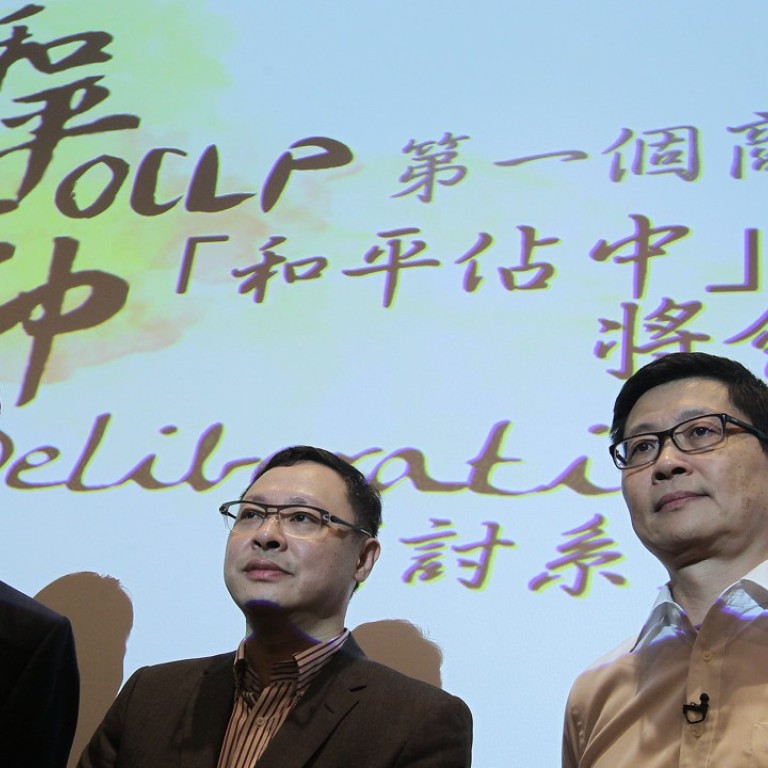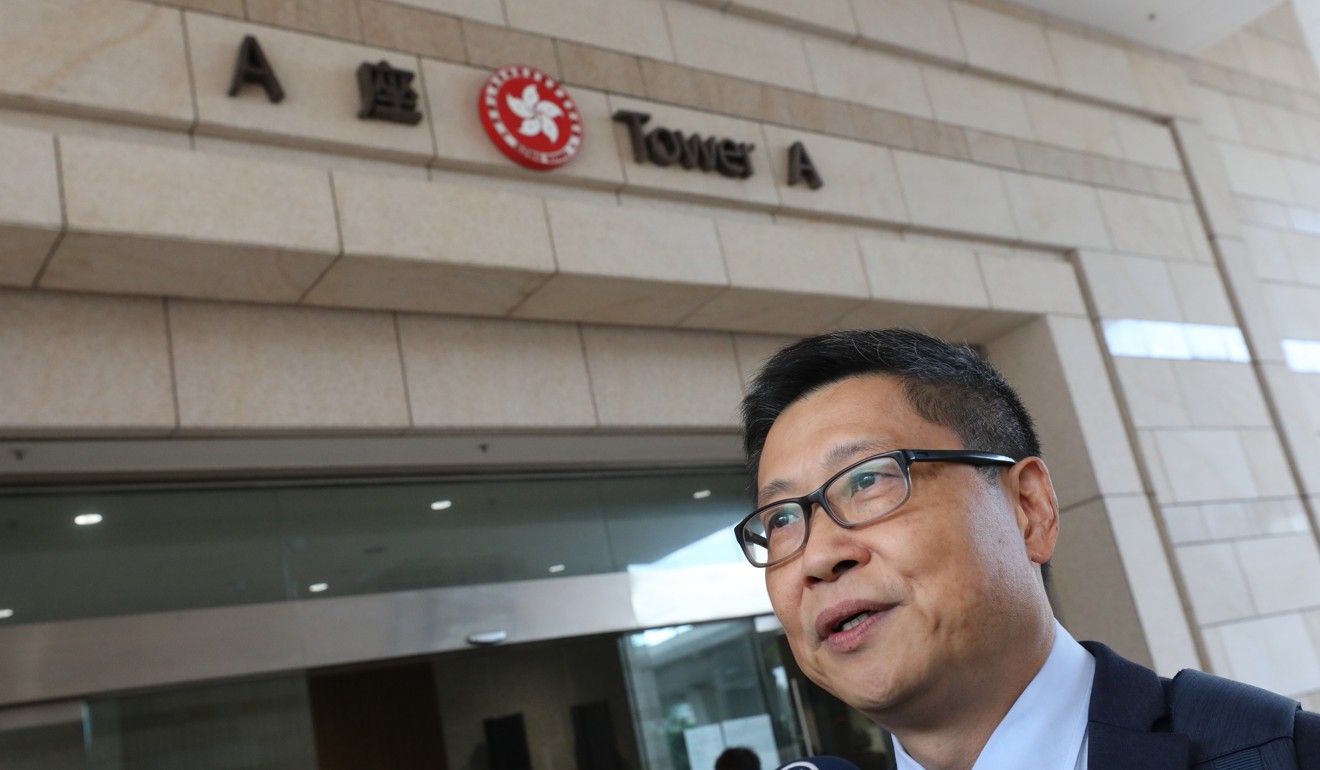
Government’s dismissive attitude led to Occupy protests, co-founder Chan Kin-man tells Hong Kong court
- Chan says movement leaders met with government officials two months before protests took place
- But Carrie Lam walked out after less than an hour, leaving pro-democracy report behind
One of the founders of the Occupy protest said the government’s dismissive attitude towards their movement set the tone for the civil disobedience that brought Hong Kong to a standstill in 2014.
On Thursday, Dr Chan Kin-man revealed that Carrie Lam Cheng Yuet-ngor, who was chief secretary at the time, and the second most powerful politician in the city, walked out of a meeting with pro-democracy activists after less than an hour, two months before the 79-day protest began.
Giving evidence at his own trial at West Kowloon Court, Chan, who faces a string of charges in relation to the protest, said Lam’s dismissive attitude ultimately led him to believe the government was not serious about listening to them, which triggered the disruption in September that year.

At the July meeting, Lam, who is now Hong Kong’s leader, insisted the founders – Chan, Benny Tai Yiu-ting, and Reverend Chu Yiu-ming – should end the movement there and then, Chan said. Also at the meeting, according to Chan, was then undersecretary for Mainland and Constitutional Affairs Lau Kong-wah, now Secretary for Home Affairs, who called the campaign radical.
“They even left [our] report on the sofa and did not take it away,” Chan said of the meeting at the Central Government Office.
Chan, who is on trial alongside eight other key figures, was the first defence witness to take stand, after prosecutors finished laying out their allegations.
The scholar said he and others were left with no choice but to block roads four years ago, when the local government would not listen to proposals on how future leaders in the city should be elected.
Security tight as jury is selected for Mong Kok riot trial in Hong Kong
Two months after the meeting protesters poured into the street on September 28, after Beijing handed down a proposal which would bar open nominations for the city’s chief executive election.
While prosecutors have charged Chan with inciting others to obstruct roads, on Thursday, the founder said he did not call for protesters to occupy the areas pinpointed by prosecutors during the trial.
He also offered a recollection, contrary to prosecutors’ allegations, that part of the crowd, especially student protesters, actually left - instead of staying - as soon as he and others declared the start of the movement. He said at the time that some students thought the founders had hijacked what started out as a student-led protest.
Chan, who has long advocated that Occupy activists should take responsibility for their actions in court, also said that he had decided to defend himself in the case.
The 59-year-old, Tai, 54, and Chu, 74, have pleaded not guilty to three joint charges: conspiracy to cause public nuisance; inciting others to cause public nuisance; and inciting people to incite others to cause public nuisance.
Occupy leaders on trial: who they are and what they’re accused of
Lawmakers Shiu Ka-chun, 49, and Tanya Chan, 47, and former student leaders Tommy Cheung Sau-yin, 24, and Eason Chung Yiu-wa, 26, have all denied the two incitement charges. So has Raphael Wong Ho-ming, 30, vice-chairman of League of Social Democrats.
Former Democratic Party lawmaker Lee Wing-tat, 63, has denied one count of incitement to commit public nuisance.
“I think these charges are unreasonable. In particularly some charges that will have a long-term effect on the freedom of speech in our society,” Chan said.
He said he would have pleaded guilty if he were charged with taking part with an unlawful assembly, but not with the present charges, which his lawyers argued were unconstitutional.
When presenting their case, prosecutors accused Chan and others of deliberately blocking three major thoroughfares in the Admiralty district of Hong Kong – Harcourt Road, Fenwick Pier Street and Tim Mei Avenue – in a bid to force the government to respond to their political demands.
But on Thursday, Chan said the founders never planned to occupy those places as prosecutors alleged.
“We had a very specific location. Charter Road,” he told the court.
He said even on September 27, a day before Tai was to start the Occupy movement, they only talked about occupying Tim Mei Avenue, a relatively minor road. And they had always expected the movement to last for about five days, he said.
When they announced the start of the Occupy protests at 1.30am on September 28, he said some of the students immediately left, unhappy with them taking over what had been a student-led protest over the past two days.
“It was a huge blow [to me],” he said, recalling that he was banned from speaking on the stage. Tai went around, urging people not to leave, but to no avail.
Chan, who was led by his barrister Gerard McCoy SC, said the intention had always been that the Occupy movement would come in four stages, with deliberation, public consultation, and dialogue with the authorities being the first three.
Only if the conversation with the government failed would they consider the act of civil disobedience – the final stage – he said.
Chan said in June, 2014, the group held a civil referendum, in which more than 792,000 took part to vote for proposals on how the city’s leadership race should be run.
Keep fighting: Pussy Riot’s message to young Hong Kong political activists
According to Chan, the three leaders contacted the government after the vote, but did not hear anything back from authorities until July, where they sat down for the meeting with Lam and other officials.
Chan said he did not believe the government was serious about the talks, as officials would not commit to a second meeting.
The scholar said that such was the desire for dialogue, that a student proposal to begin civil disobedience at the start of July was rejected.
“We believe we should exhaust the way of dialogue before using civil obedience,” Chan recalled telling students at the time.
Four years on, he said he was responsible for naming the movement, which started out as “May Love and Peace Occupy Central”.
“The starting point of the entire movement is our love for Hong Kong,” he said.
The trial continues before Judge Johnny Chan Jong-herng.

